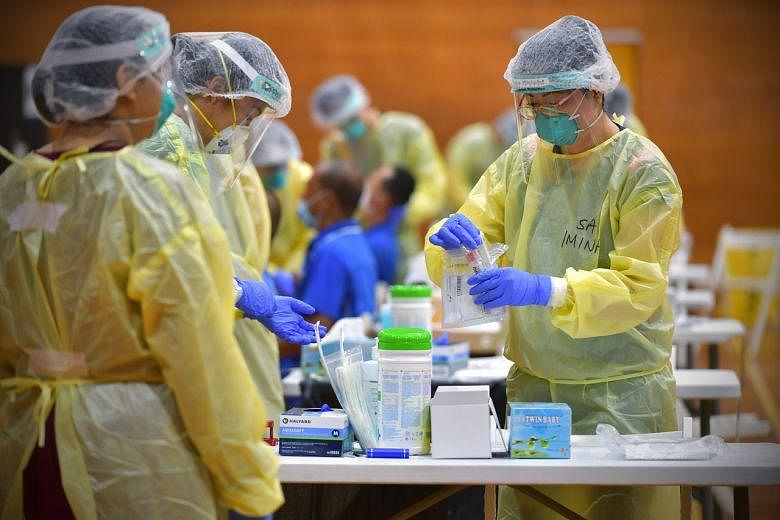The issue of political succession has cropped up again, after former deputy prime minister S. Jayakumar urged the Prime Minister to stay on to lead Singapore, if the Covid-19 crisis continues.
In a new book on governance (Governing: A Singapore Perspective) and in media interviews to promote the book, Professor Jayakumar said: "If 'normalcy' has been restored before the next GE, I think the public will support his desire to step down as PM.
"However, if the crisis persists, I believe many Singaporeans will want him to reconsider that aspect of his timeline as well, and hand over only after Singapore has turned the dangerous corner."
It is still early days, but that scenario has to be considered, Prof Jayakumar added. "Much will depend on the success of measures taken to address both the health and economic fronts."
Mr Lee Hsien Loong, who became prime minister in August 2004, has said he hopes to step down as PM by the time he turns 70, which would be in February 2022.
Prof Jayakumar is articulating a view commonly held among a segment of Singaporeans. Even before the pandemic struck, I've heard people - mostly from the Pioneer or Merdeka generation - ask how Singapore will fare when PM Lee steps down.
The 4G team is led by current Deputy Prime Minister Heng Swee Keat, 59, who was endorsed as their leader in November 2018. He in turn chose Trade and Industry Minister Chan Chun Sing, 51, as his deputy.
Singaporeans understandably want a smooth political succession, to reduce the potential for surprises or conflict, especially in the middle of a global pandemic. But Singaporeans should also not become too overwrought over who the future prime minister should be, or when he should assume power.
Singapore has survived two changes of PM and will survive a third. Many parliamentary democracies see much more frequent rotations of PMs - Australia, Japan, Britain - and remain high-functioning societies, partly because of strong institutions.
So with all due respect to Prof Jayakumar and those Singaporeans who urge PM Lee to stay on for another term or so, I must say I disagree.
PM Lee should not tarry too long. Instead, he should hand over to the next team soon after the Covid-19 situation has been brought under control.

After the Covid-19 crisis hit and he was asked if he saw himself continuing as PM beyond 70, he had said this depended on how the pandemic can be brought under control. He had promised to see through the Covid-19 crisis and to "hand over in good shape as soon as possible to the next team, and into good hands".
Timely succession is important because it is vital for political leaders to be renewed to keep pace with generational change in the population. Singapore's population is changing rapidly. The July 10 General Election is a vivid example of how fast the electorate's expectations are changing.
The People's Action Party (PAP) government had incumbency advantage; a massive war chest to fight Covid-19; and ran a relatively clean campaign that toned down its usual hardball politics. And still it lost Sengkang GRC, a new estate that is the bellwether of the future electorate. It could not take back Aljunied GRC. It nearly lost West Coast GRC. It got 61.2 per cent vote share, the third lowest since independence.
Elections are like a family crisis - they have a way of clarifying matters and bringing to the surface latent unhappiness and resentments otherwise buried in daily life. While the PAP won a clear mandate, the election also showed that some voters feel a disconnect with the party.
As a government, PM Lee and his 3G team have presided over an economy that has grown healthily, expanded social safety nets generously, and built an amazing cityscape. Yet, it is also during their watch that income inequality has deepened; class divides have become more pronounced; and anti-foreigner sentiments have risen.
Meanwhile, disruption caused by technological change is hastening as digitalisation takes root across workplaces, thanks to Covid-19. The disrupted future is here among us, but many local enterprises and workers, trapped by inertia or ignorance, are not ready.
Passing on the baton to the 4G decisively allows a new generation of leaders to rethink possibilities, question past assumptions and forge a new social compact with a new generation.
Team dynamics
Some of those who want PM Lee to stay on for another term or more, prefer a longer runway to allow the 4G to decide among themselves who should be their leader.
Mr Heng suffered a stroke in May 2016, and the concern is who can take over as PM should his health fail, although he has made an excellent recovery.
Will there be rivalry and political contest, leading to policy disruption and bureaucratic infighting? While Mr Heng has described Mr Chan as his deputy, there are other prominent members of the 4G team such as Transport Minister Ong Ye Kung, 51 this year, and Education Minister Lawrence Wong, 47.
The thinking is that a longer timeframe gives the 4G team time to work out its dynamics and iron out any latent rivalries.
This is a reasonable hope, except that it ignores the fact that the 4G has in fact already picked its leaders, the way past generations did. The 2020 election results did not fundamentally change those dynamics.
As is common in parliamentary systems, Singapore's first three PMs were chosen by peers within their party, not by voters. Mr Lee Kuan Yew became PM after a split vote within the PAP was broken by party chairman Toh Chin Chye who cast his deciding vote in Mr Lee's favour.
Mr Lee's top picks to succeed him did not include Mr Goh Chok Tong; Mr Goh was picked by his peers and became PM in November 1990.
Mr Lee Hsien Loong took over from Mr Goh as PM in August 2004. PM Lee was both Mr Goh's choice, and the choice of his peers.
Mr Heng too is the choice of the 4G and he has picked Mr Chan to be his deputy. So the issue of succession to the PM post should be settled for now.
In any case, the focus on who should be PM should not be overblown.
Singapore is not run by an individual. Even the strong-willed Mr Lee Kuan Yew did not operate alone; he had a strong team to back him. Together, they steered Singapore safely through the shoals of existential crises, and laid the foundation for its success.
Today's far more complex world requires an equally strong team. PM Lee has reminded Singaporeans of this, when he said in January 2018: "Maybe it's the way that the media and public politics is played in many countries nowadays, it's personalised as one person. And the face becomes familiar. And you think that everything is done by that person. Actually it's not… there's a team.
"The team works together and they have one, as Mr Lee Kuan Yew said, striker. Now you have to strike from time to time, but you're really also sometimes spokesman on behalf of the team, bringing together a collective wisdom and giving voice to that. And I think in the next team, that aspect of it will have to be even more important."
The 4G team is already taking shape, with Mr Heng as leader. He was made first assistant secretary-general in November 2018 and became deputy PM a few months later, in April last year.
The 3G showed their confidence in their younger colleagues by ceding the front line of the Covid-19 fight to 4G ministers - Health Minister Gan Kim Yong and Mr Wong, who co-chair the ministerial task force on Covid-19 and front the regular media conferences - and it has paid off well, as Singaporeans have a chance to hear from, assess and form a rapport with them.
Such bonds are formed only in the crucible of crises.
As it is, Singaporeans are coming to accept the 4G crop of leaders, who are doing a creditable job leading the nation's fight against Covid-19. A clear road map from lockdown to business-as-usual was planned months before, and is slowly being rolled out as indicators are met. Infection numbers are down to single digits daily, mainly from imported cases which are quickly quarantined and ring-fenced. An election took place without sparking a community outbreak. The economy is opening up, while infection numbers remain low. Borders are slowly reopening. Public compliance with mask wearing and social distancing is high, suggesting strong support for such measures.
Thanks to the 3G stepping aside to let the 4G lead, Singaporeans have a reservoir of new images to add to the political memory, such as Mr Wong tearing up over the sacrifices of front-line staff.
It is from such shared moments that genuine connections are made, and understanding grows.
The coming slew of conversations, and the active agenda of policy changes in the works, will give many Singaporeans the chance to hear from, meet, see and otherwise experience the 4G leaders.
As a team, they must gel together, manage personal competitiveness, work to one another's strengths, and tap the wisdom and experience of the 3G senior ministers in their midst, to position Singapore smartly for the post-Covid-19 world.
Delaying the process of political transition longer than necessary to tackle the pandemic crisis will hamper the ability of the 4G to connect with Singaporeans - to listen to them, to understand their aspirations, and to prove to them that they can deliver.
Correction note: In an earlier version of this article, we said PM Lee took office in 2014. It should be 2004. We also said PAP had 61.2 per cent vote share in the recent general election, the second lowest since independence. It should be the third lowest. We are sorry for the errors.


